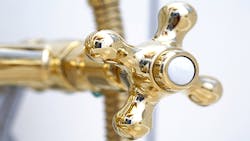AFS Refutes Research, Conclusions of Copper Alloy Project
The American Foundry Society has refuted the results of a research study of which it once was a participant, stating that the "Lifecycle-Based Alternatives Analysis of Lead-Free Brass Substitutes in the Potable Water Supply System" project contains “incorrect conclusions” and is based on inaccurate data and methodologies. The project was conducted by Peter Sinsheimer, executive director of the sustainable technology and policy program at the University of California at Los Angeles (UCLA).
The study’s authors have not responded to the AFS statement.
AFS is a trade organization for North American metalcasting businesses, which it notes represent a $30.3-billion industry. Plumbing and water-handling products is one of numerous market sectors in which metal castings are critical considerations for manufacturers and consumers.
One issue shaping the research as well as the industry’s position on the issue is the 2011 Federal Safe Drinking Water Act, which required that all cast copper components used in potable water applications contain less than 0.25% lead.
AFS emphasized that “no-lead” alloys have been available and in production for more than two decades, and multiple no-lead alloys already available meet and exceed federal regulations. And, it noted that AFS members and other companies continue to research and introduce more no-lead brass alloys for potable water applications.
The Lead-Free Brass Substitutes project was initiated to determine the viability of safer alternatives to lead-containing copper and brass components used in water applications, and for several years AFS and some member companies served on the Advisory Committee for the project. AFS publicly withdrew from the project in February 2016, announcing that the direction of the research lacked “a sufficiently robust analysis and as a result promotes a single alloy as the best viable solution to meet the new legal requirements, while discounting other equally viable alloy alternatives.”
Several AFS member foundries that produce copper components had withdrawn prior to that.
In addition to the conduct of the research, AFS now explains that it disagrees with the project’s estimates regarding the future volume of cast no-lead components and alloys that will be required to meet those needs.
AFS stated that the study “contains many inaccuracies in the data and methodologies, and (it) contests the report’s conclusion that the use of copper bismuth alloys for potable water applications should be discontinued. Researchers incorrectly assumed scrap from alloy and component manufacturers cannot be recycled because it is a contaminant that cannot be separated from copper.”
In addition, the group noted that the researchers conducted all of the melt testing at a one location, which is not representative of others in the industry. AFS said it does not believe that the testing was conducted using metalcasting-industry standard procedures.
Also, only a few of the most common no-lead alloys were tested, and several prominent no-lead alloys are currently in commercial use but were not included in the research.
AFS also stated that the limited scale of testing did not include the effect of the total foundry manufacturing process, including melting, production, machining, and recycling.
“From the beginning of the UCLA project,” the group stated, “AFS raised red flags about the study because it seemed to be focused on identifying a single best commercial alloy for all applications. The marketplace has already demonstrated that multiple alloys are required, and this assumption that there could be a single alloy solution continues to raise questions that undermine the study.”
About the Author
Robert Brooks
Content Director
Robert Brooks has been a business-to-business reporter, writer, editor, and columnist for more than 20 years, specializing in the primary metal and basic manufacturing industries. His work has covered a wide range of topics, including process technology, resource development, material selection, product design, workforce development, and industrial market strategies, among others.
